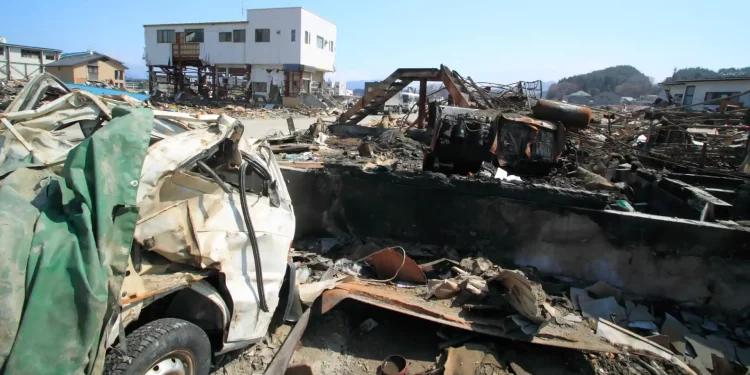The first earthquake prompted Japan’s Meteorological Agency to issue a “major tsunami warning,” the first issued since 2011.
Japan started the new year with a devastating humanitarian crisis as a series of powerful earthquakes centred around the Noto Peninsula in Ishikawa prefecture wreaked havoc on the western coast. The initial 7.5-magnitude quake, followed by numerous aftershocks, struck on January 1, 2024, resulting in widespread destruction and casualties and triggering tsunami warnings across the region.
The earthquakes have caused many buildings to collapse, started fires, and even led to landslides, with the city of Wajima being among the hardest hit. At least 30 people have been confirmed dead, and the death toll is expected to rise as rescue operations continue. The Noto Peninsula, most known for its tourist-drawing landscapes, has been partially cut off due to damaged roads.
Immediate Impact, Ongoing Rescue Efforts, and Extent of the Damage
Prime Minister Fumio Kishida, addressing the nation after an emergency disaster meeting, revealed that a crucial road leading to the affected area had been destroyed, hampering rescue efforts. The government has mobilised all available means of transportation, including aerial and marine craft, to ensure the swift transfer of supplies and workers to the affected regions.
Aerial assessments have revealed the scale of devastation to be massive, including damaged roads, landslides, and large fires. In Wajima, a coastal city famous for its morning market and traditional lacquerware, more than 100 shops and houses were reported to have burned down, adding to the already dire situation. The full extent of the damage is still being assessed, but it looks like it is fortunately not as bad as the apocalyptic levels witnessed in the 2011 Fukushima disaster.
Over 30,200 people in Ishikawa have sought shelter in evacuation centres, as health officials reported difficulties in treating wounded patients due to damaged roads preventing medical personnel from reaching their workplaces. Power outages affected 45,700 households, and harsh winter conditions exacerbated the challenges faced by those displaced.
Tsunami Warnings and International Response
The first earthquake prompted Japan’s Meteorological Agency to issue a “major tsunami warning,” the first issued since 2011. Although the warnings were later downgraded, some coastal areas did experience tsunami waves, causing even more challenges for residents and authorities. Some waves even reached as far as North Korea.
The international community, including the UK, Taiwan and the United States, quickly expressed their solidarity with Japan. British Prime Minister Rishi Sunak assured that the UK stands ready to assist, while US President Joe Biden said that his administration is in contact with Japanese officials and is fully prepared to provide assistance. The United States Geological Survey reported at least 35 smaller aftershocks near the epicentre, with seismologists warning that aftershocks could continue for months.
Economic Costs
The economic costs of this disaster could be massive if the 2011 experience is anything to go by. The 2011 Fukushima earthquake and its aftermath had staggering economic consequences for Japan. The “Triple Disaster” – earthquake, tsunami, and nuclear meltdown – resulted in massive destruction and financial losses. More than 138,000 buildings were destroyed, causing an economic loss of $360 billion. This made it by far the most expensive disaster in human history.
The economic impact extended beyond Japan’s borders, affecting global supply networks. Disruptions in Japan’s extensive supply chains led to significant drops in industrial production, impacting not only Japan’s economy but also countries connected through these networks. While Japanese companies quickly restored supply chains, the long-term economic consequences of shutting down nuclear reactors were more severe. Since the disaster, only two nuclear reactors have restarted operations, leading to record trade deficits of around $78 billion in 2012. This could be bad at a time when global lanes are already under stress from lockdowns, protectionism, piracy, and war.
Nuclear safety is a paramount concern given the country’s history with the Fukushima disaster in 2011. The seismic shock triggered rigorous evaluations of Japan’s nuclear infrastructure. The government and relevant authorities took proactive steps to assess the resilience of nuclear power plants, implement stricter safety protocols, and bolster emergency response capabilities. Continuous monitoring and evaluation of nuclear facilities were prioritised to address any potential vulnerabilities caused by the earthquake.
The world prays as Japan grapples with the aftermath of these devastating earthquakes. International assistance and Japanese resilience will play a crucial role in mitigating this tragic start to the new year. The coming days will be critical as Japan confronts the challenges of recovery and works towards rebuilding.
















